“Jemi nje” (We are one). Over the last decade, this has become one of the most repeated mantras from fans of Albania’s national football team. It conveyed the idea that all Albanian footballing talents should unite under one flag to achieve all of their sporting dreams.
It was a successful formula. At Euro 2016, qualification for which is the pinnacle of Albanian footballing success, 11 of the players who made the final 23-man squad, had their origins in Kosovo and another was born in Macedonia. No wonder the fans called it the ‘All-National team.’
Ethnic Albanians born outside of Albania’s borders wearing the red and black shirt is not a new phenomenon (Prizren born goalkeeper Arjan Beqaj became the first in 1998), but the reign of Gianni De Biasi as Albania’s manager has seen their numbers soar. De Biasi and his assistants have scouted players from across Europe and managed to create a group of enormous talent, including the squad that would go on to rewrite the books of Albanian football history.
However, by September 2016, when the football calendar had rolled around to qualification for World Cup 2018, the Jemi nje slogan had quietly begun to disappear from the stands. The reason was quite simple: Albania’s fans were aware that there were now two different Albanian teams that they could support, and that players could represent.
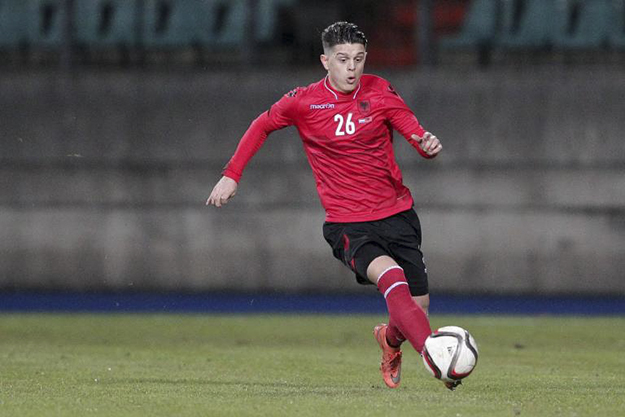
Milot Rashica appearing for Albania in March 2016 in a friendly against Luxembourg. That August, he declared his intention to retire from Albania and represent Kosovo. Copyright: Rodolfo Buhrer/imago/Fotoarena.
For a lot of these fans, and to some extent the Albanian Football Association, the process that started in August, when players started switching from Albania’s to Kosovo’s national team, came as something of a surprise. After all, players like Milot Rashica, Amir Rrahmani and even Herolind Shala, represented Albania’s footballing future; players that had been part of the youth teams in leading roles, and were intended to feature prominently in the first team in the following years.
They should have seen it coming.
The process had begun years before; and had nothing to do with a call up for the European Championships, or playing in the starting lineup instead of sitting on the bench. It had begun with the athlete that is now considered the leading representative of Kosovo sports across the world: Majlinda Kelmendi.
It became clear that funding was not enough, and that the talented judoka needed to feel part of a project.
Kelmendi’s road back to Kosovo
The young judoka’s talents were evident ever since her early years in the sport. However, unfortunately for Kelmendi, a lack of international recognition for Kosovar institutions was hindering her chances of success. The National Olympic Committee (NOC) of Albania offered to help, and Kelmendi spent her early years representing Albania in international competitions.
Kelmendi was considered one of Albania’s greatest talents, and funded by its NOC’s Olympic Scholarship program, as she was the country’s highest hope for a long sought after first Olympic medal.
But as soon as the Kosovo Judo Federation (KJF) began to be recognized by the international community, it became clear that funding was not enough, and that the talented judoka needed to feel part of a project.
The Albanian NOC failed to understand this at the time, and took for granted Kelmendi’s lack of other available options. Her request to take part at the London 2012 Olympics under either the Kosovo flag or the International Olympic Committee flag, although enlisted under the Albanian NOC, caused consternation in certain corners of the Albanian sporting world.
Stavri Bello, the Secretary General of the NOC of Albania, made his views at the time clear: that Kelmendi owed her participation to Albania. “She competed in qualification events under the Albanian flag and her qualification came under Albania,” he told a press conference in 2012. “This means that unless Kosovo is present in London 2012, she shouldn’t compete with the International flag.”
Her request was eventually rejected and she was part of Albania’s delegation at London 2012, where Kelmendi was aiming for a podium finish but ended up eliminated from the competition in the second round. It would be the last time she competed with the double headed eagle on her judogi.
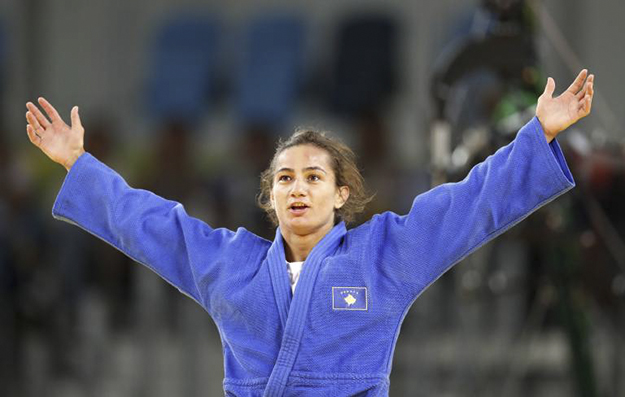
Majlinda Kelmendi celebrating winning the gold medal at the 2016 Rio Olympics — with the Kosovo flag on her judogi. Copyright: Rodolfo Buhrer/imago/Fotoarena.
Starting from 2013, Kelmendi represented the newly internationally recognized KJF. Her career blossomed and she became one of the most successful Albanian sportswomen of all time. In 2016, she won Kosovo’s first ever Olympic gold medal.
“It means a lot that I can successfully represent Kosovo, a small country with many problems,” Kelmendi told KosovaPress in 2014, after winning her second gold medal at the World Judo Championships. “There are people here who have no homes, have nothing to eat, children who can’t go to school. To become World Champion coming from this country is an indescribable feeling.”
It is this quote that best captures what pushed Kelmendi to represent Kosovo. Even in 2012, the teenager made it clear that she was not disrespecting the Albanian flag, just that she was trying to find a way to represent her roots, her home, her neighborhood, her city, and everybody who had supported her and stood by her.
Kelmendi’s departure though, had begun a separation process that many would not understand.
The footballing exodus
Maybe because judo has less mainstream appeal in Albania, Kelmendi ‘got away with it’ and the word ‘traitor’ was rarely used for her. Footballers treading the same path as Kelmendi were not so lucky. Players choosing to represent their families, their villages, their neighbors, and often taking a less easy path to do so, were regularly branded with the word.
The footballing exodus started with Samir Ujkani. Many assumed the goalkeeper felt he was not being treated fairly, after losing his starting spot in Albania’s first team to Etrit Berisha. Berisha’s success between the sticks meant Ujkani’s absence was not strongly felt, and many imagined that playing in friendly matches for Kosovo was his only option, as he would not find space in Albania’s team.
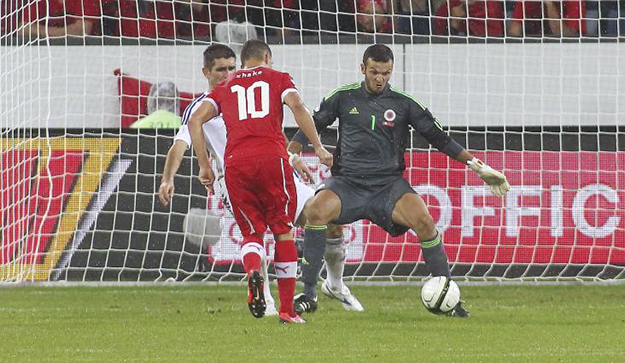
Samir Ujkani, in goal for Albania, blocks a shot from Switzerland’s Granit Xhaka in a World Cup qualifier in 2012. Both players had Kosovar roots, but only Ujkani would go on to play for the Kosovo national team. Copyright: imago/Geisser.
Ujkani could have easily accepted a place on the bench with Albania, and become part of the historic first Albanian squad that would taste the experience of the European Championships in 2016. In a conversation with Albanian Football Association president, Armand Duka, he stated that he would “run to help Albania” if his assistance were needed. But he also informed him that his “blood was calling” and he just could not say no.
Ujkani lost two uncles during the war in Kosovo. Now, the small country wanted to show that the sacrifice of those who lost their lives would mean something. Kosovo was trying to show that it was very much alive, not only on paper, but everywhere it mattered, even on the football pitch. “I had promised my father I would play for Kosovo sooner or later,” Ujkani told the press before his debut with Kosovo in the 2018 World Cup qualifiers.
When he stepped on the pitch in Turku to play Kosovo’s first official match, he was captaining a hugely talented group, albeit one which would cause so much division between Albanian fans. Many others had joined him in switching from Albania to Kosovo. On that historic night in the Veritas Stadium he would share the joy of Kosovo’s first — and until now only — positive result in the qualifiers alongside Amir Rrahmani, Milot Rashica, Alban Meha, Herolind Shala and Vedat Muriqi, whom had all represented Albania before. They had chosen to embrace a project, but first of all, they had answered ‘the call,’ the same way Ujkani had done.
The division between the two sides was becoming clearer every day, as players began pledging allegiances to one side or the other in a mismanaged public show.
Still they were considered traitors by Albanians on both sides of the border. Since Rashica declared his desire to play for Kosovo, stating in an open letter that this “was not a choice against Albania, but one for Kosovo where he was born and raised,” he and his fellow team mates have suffered endless abuse. While Kosovo fans welcomed the new players, seeing a bright start for the team in its first tournament, supporters of Albania’s team were not so friendly.
When Milot Rashica announced his decision to play for the Kosovo national team on Facebook, he received a torrent of abuse, with commenters labelling him ungrateful, a traitor, and even resorting to personal attacks, one commenter called him “the son of a whore.” Kosovars supportive of his decision replied angrily to some of these comments, beginning an online war of words and an unprecedented outpouring of hatred and division between Albanians.
The fight over players’ futures
While the situation fanwise was spinning out of control, the two football federations tried to act as though everything was normal, though it was clear that the Albanian Football Association was not expecting the ‘transfers’ of Rashica and Rrahmani.
While officials and players alike stated that choices were individual, and that no one on either side was irreplaceable, concerns about a mass exodus from Albania were growing. Off the record, many of the members of Albania’s Euro 2016 squad with Kosovar origins had stated that they had been approached time and again by officials from the Football Federation of Kosovo (FFK), wanting to know if they were willing to switch.
Until late August, when FIFA made it clear that those who took part in Euro 2016 would not be eligible to switch sides, there was a lingering doubt that Albania would be depleted and lose much more than youngsters who had played a little or no role in the road to France 2016.
Nevertheless, the division between the two sides was becoming clearer every day, as players began pledging allegiances to one side or the other in a mismanaged public show. The two managers have also not been subtle in their declarations, fueling more discord between the sides.
De Biasi stated that those who left, had only done so because he had not invited them to Euro 2016. “I was disappointed by their choice,” he told TV Channel Super Sport at the end of 2016. “The fact that I had taken them to the training camp with us stated that we planned with them in the future. But they made their choice, and we lost nothing from players whom had given no contribution to the national team.”
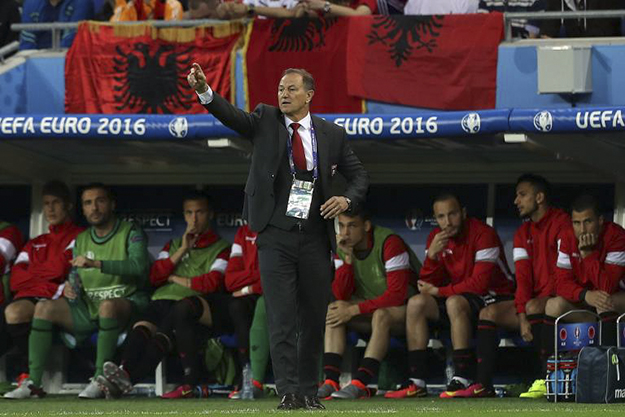
Albania’s Italian manager Gianni De Biasi, who has made every effort to utilise all the talent potentially available to Albania’s national team. Copyright: imago/Eibner Europa.
Kosovo coach Albert Bunjaki has also levelled criticism at De Biasi, after the Italian contacted every player he had selected for Albania personally, asking them to clarify their intentions. “He has put the players in an awful situation,” Bunjaki told Koha Ditore in July 2016.
Bunjaki has also repeatedly stated that players were ready to leave Albania and had contacted him to do so, asserting that, in the future, the best Kosovar players would not chose to wear the red and black shirt. “Up to 50 players are on our list now,” he told Zeri in August 2016.
De Biasi’s knee-jerk reaction to this news was to call up Azdren Llullaku, Eros Grezda and Liridon Latifi for the first official matches of the 2018 World Cup qualifiers — all players potentially eligible for Kosovo. This prompted officials from the FFK to argue that he was just trying to stop Kosovo from approaching them. There were similar thoughts on Albania’s side of the border as well.
Tensions have continued, as invitations to train with Albania’s youth sides are still being sent to Kosovar youngsters all over Europe.
Astrit Hafizi was the manager of Albania between 1992 and 1999, and is one of the most prominent figures in Albanian football. He believes that the divisions have become clear for everyone to see. “Before Kosovo became a member of UEFA and FIFA, relations were good,” Hafizi told Panorama Sport in October 2016, days before Kosovo took on Croatia in Shkoder. “But I believe divisions between both sides will keep growing. De Biasi is taking shortcuts. He sees that people like Grezda and Latifi are playing well in their respective championships and he calls them up, instead of scouting all of Europe for talents. He calls up these two, even though they are from Kosovo. In this kind of situation, the Kosovo coach or Federation have the right to be upset, because these are not players from Albania.”
Tensions have continued, as invitations to train with Albania’s youth sides are still being sent to Kosovar youngsters all over Europe, often the same names that the FFK were seeking. Some of the most prominent players in the latest Albanian under-21 side’s training camp were of Kosovo origins. The same is true of many members of Albania’s under-17 and under-19 teams that took part in the European qualifiers at the end of 2016.
Albania v. Kosovo: no longer just friendlies
The situation could get even worse. Albania and Kosovo have become rivals not only for the same talents, but also for the same international objectives. Tirana against Peja in the Balkan International Basketball League, was just a small taste of competitiveness between club sides from the two states.
In April, the two women’s national football teams will meet in Tirana, not for friendlies like they have often done over the last couple of years, but for the right to take part in the next stage of qualifiers for the Women’s World Cup. Players from Kosovo used to play for Albania in official competitions up until recently, but some are thinking about switching to face the red and blacks as opponents.
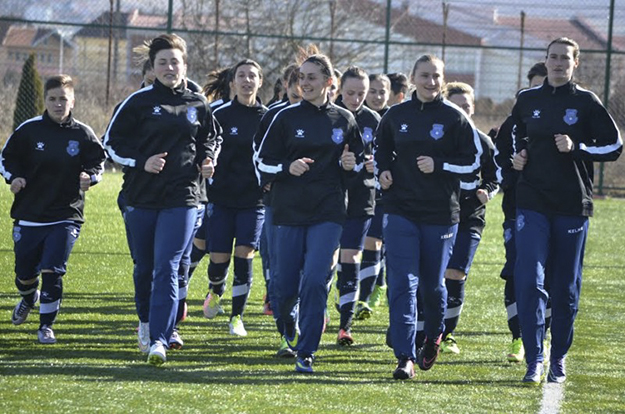
Kosovo’s women’s national team in training in February 2017, preparing for their first ever world cup qualifier — against Albania. Photo courtesy of the Football Federation of Kosovo.
“The girls will make the choice themselves. No pressure will be put on them. But the right to return will not be denied as well. Morally, we must give a solution to the desire and will of the players,” Aferdita Fazlija, manager of the Kosovo Women’s National Team told Koha Ditore,
Fans on both sides have claimed that every Albanian footballing success was dependent on Kosovo-born talent. With a win for Kosovo over Albania in an official match, those voices could grow louder still.
Armend Dallku was born in Vushtrri, Kosovo and was capped 64 times by Albania. However, he is also the captain of FC Prishtina, and hopes to lead his club into Kosovo’s first ever participation in the Champions League. His loyalties divided, he does not relish the prospect of a men’s match between Kosovo and Albania. “I hope it never happens. But if it does, I hope that the Albanian fans will handle it as a footballing feast, like they did with the European Championships,” he told K2.0.
Dallku still thinks there should be a strong team to represent all Albanians, because splitting would make future participation in competitions less likely. “I have always thought that we should have a very strong national team to represent us at the highest levels,” he told K2.0. “But now we have to face this new reality where Kosovo justly has the right, after so many years of suffering, to represent itself internationally.” The defender also believes that Kosovo and Albania have enough good and eligible players for two strong national teams, but has reservations that either would maintain the quality both sides possess currently.
With divisions and doubts growing, the only calm heads appears to be the leading figures of both governing bodies, Armand Duka and Fadil Vokrri. After stating for years that a common club tournament was impossible, reports have emerged that Duka and Vokrri have begun talks to develop a competition involving clubs from both Kosovo and Albania. It won’t be the All-Albanian League that many fans have requested for years, but still a tournament in which clubs from both Albania and Kosovo will face each other.
Will it serve to again unite sport in Albania and Kosovo? Or will it create bigger divisions through the rivalry it will create between fan groups? Only time will tell if the banner “Jemi nje” will proudly unfurl once again at Albanian sporting events.K
Feature image: Atdhe Mulla / K2.0.

Back to Monograph on Sports








Some decent points but at the same time some very debatable points made. As for the 'footballing exodus' to start with the likes of samir ujkani is questionable to say the least he would most certainly not have made the bench for Albania, whereas for Rrahmani he himself openly stated he chose Kosova as he felt he had a better chance of getting more minutes, the only true decision that shocked Albanians was Rashica. Personally as a Kosovan myself, I felt our FA had failed in the manner it went about targeting players. It did so as if it was taking players from a foreign national team eg Switzerland and seemed to forget that this was Albania they were targeting. This coupled with our naive managers comments about Albania further added fuel to the fire. What people like to forget now a days and what you fail to do in this article is show the other side, I'm not sure if this is because there was a word limit or perhaps a other reason. However, the Albanian flag and colors represent the Albanian people, which include those in Kosova, those in Macedonia, those in Greece, Montenegro and all over the world, as someone who travels frequently from all corners of Kosova to Albania I can happily say that yes we still are one even if attempts are being made to divide us. Ultimately what this is, is a battle that the Kosovan footballing officials have started. The people themselves still believe they are Albanian and still acknowledge that red and black are our true colors not the superficial blue and yellow that we have been made to wear which have nothing to do with us and our people. Our history runs deep and is greater than a few negative comments on social media.